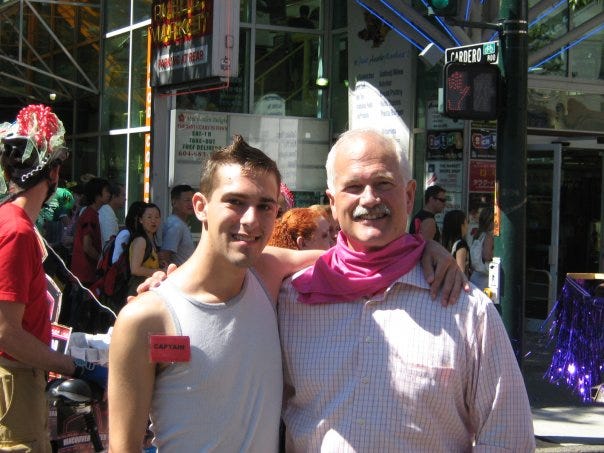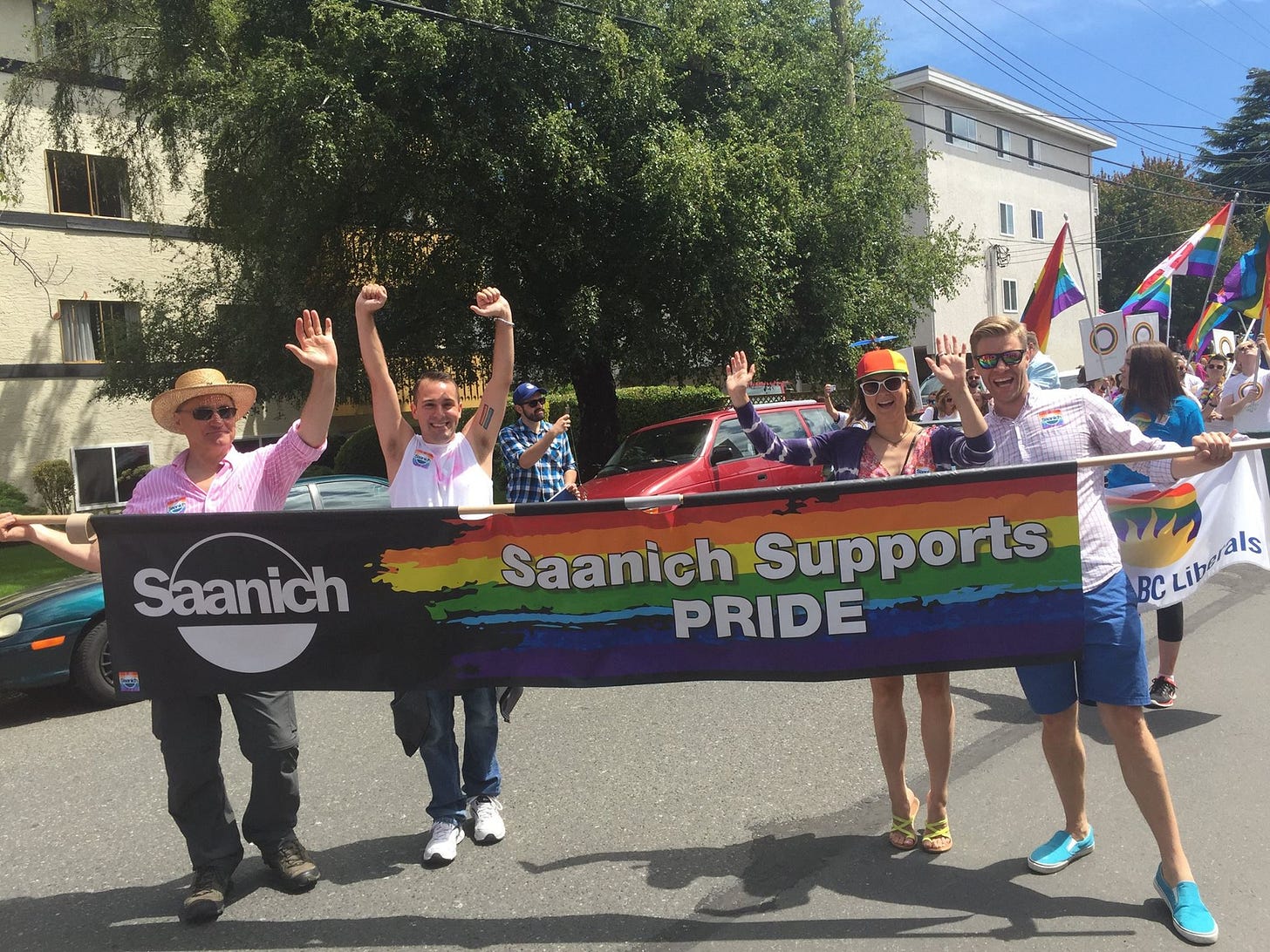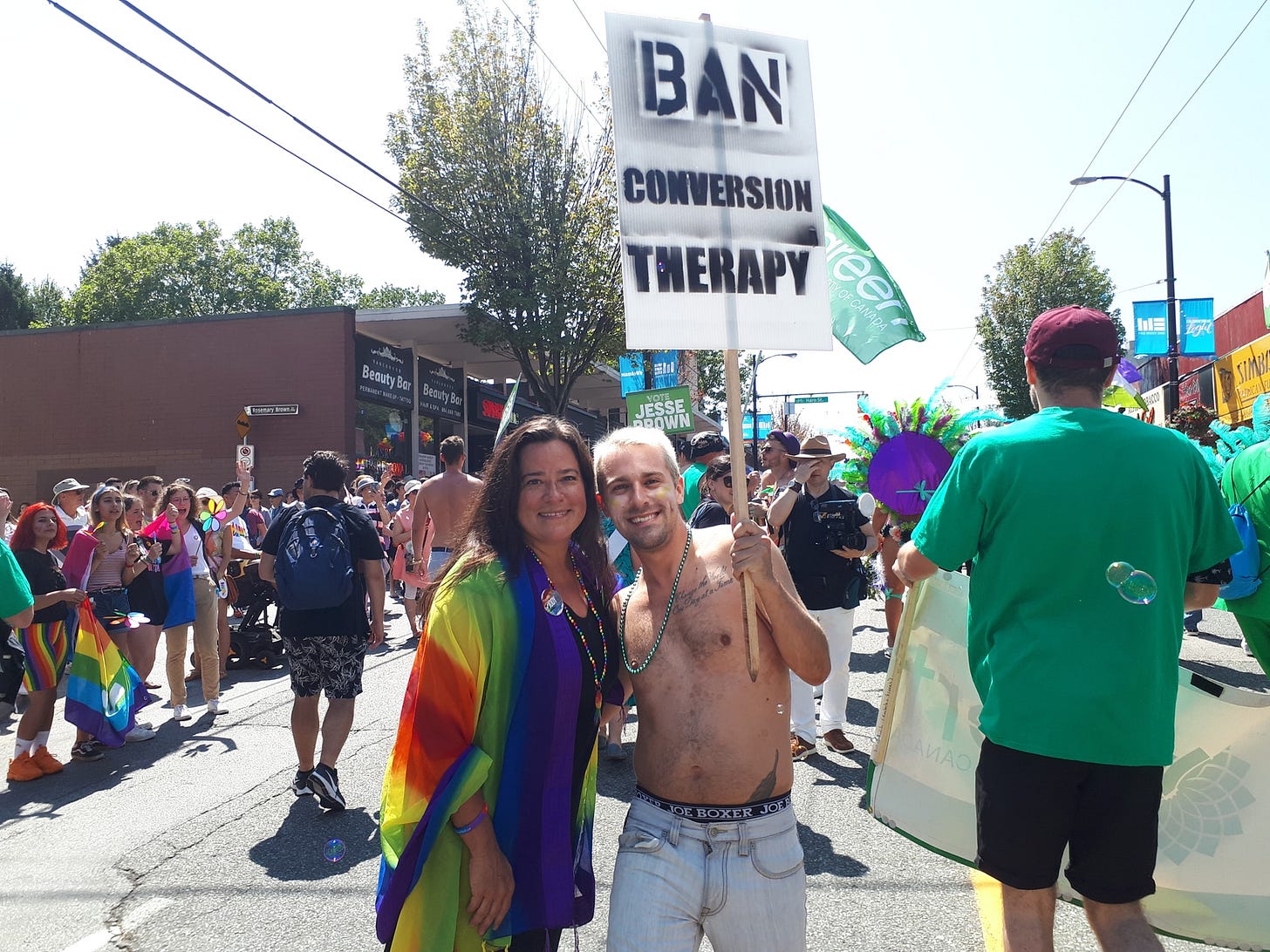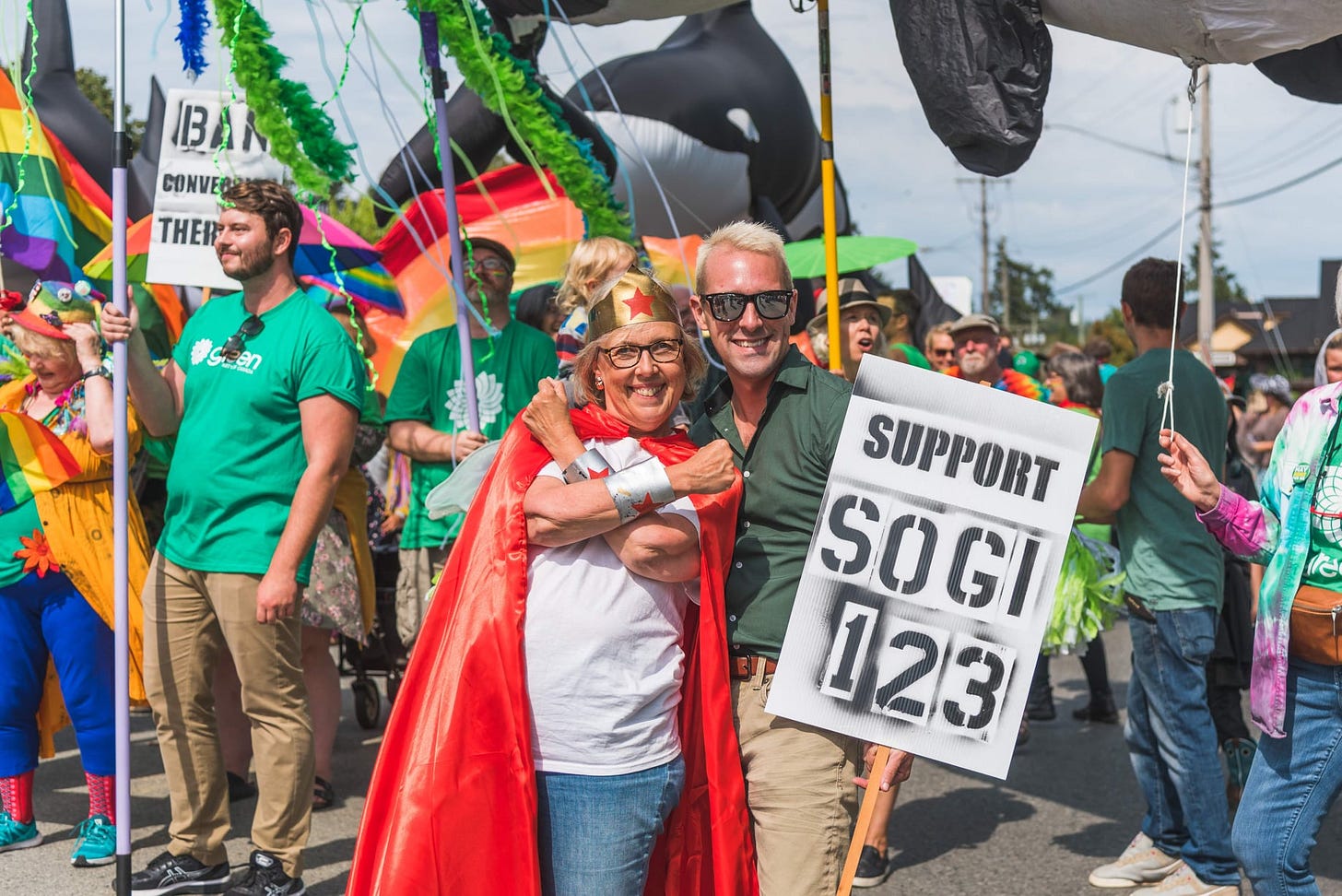Pride is a protest
Pride, for me, has always been about something that has been denied — queer joy
It was the summer of 2005. I had just graduated high school, and that summer same-sex marriage was legalized. Ten days later, I got in a van and rode down to Vancouver to attend my first ever Pride.
Salmon Arm did not have much of a queer community when I was there. I knew of one other gay fellow in high school — a year older than me — who was the target of much harassment due to being more flamboyant. I could name two or three other folks I knew in the community, who I mostly knew through being an avid theatre kid. The closest thing we had to a Pride parade was when I walked over to Tim Hortons for donuts.
We gathered at a spot on Robson Street, and waited for the parade to arrive. It filled me with anxiety and excitement to be there. The roar of oncoming motorcycles signaled the start of the festivities. The Dykes on Bikes ripped past us and zoomed back and forth, confidently waving at the cheering crowd.
Soon community organizations marched by, followed by businesses, corporations, politicians and all sorts of groups. I was so overwhelmed I don’t remember any of them specifically, but I do remember one particular float celebrating the passage of same-sex marriage and the many battles that preceded it on various placards. It's one of those memories I can still picture perfectly.
Shortly after, we packed into the van and drove back to the Shuswap. I moved to Vancouver six months later.
Pride, for me, has always been about something that has been denied — queer joy. All my school-aged life I was told through anecdotes, pop culture and observation that gay people have miserable lives — ostracized, rejected and vulnerable. When I looked at the people smiling, waving and cheering along Robson, it was the opposite of what I was told. It was joyous, celebratory and showcased a vibrant community beyond my teenage imagining.
Pride is a protest. From the first marches following the Stonewall riots, its roots have always been about resistance — pushing back against the oppression and violence that queer people experience for existing in a world that can be overtly hostile to us. Rage built up within the community boiled over, took to the streets, and has continued to gather every year since. “Pride Month” is June, but there are Pride events all summer in communities around the world.
One aspect of Pride that stood out to my politically-oriented self was the presence of politicians. They were ostensibly there to support us, which meant they needed to listen to us, at least for one afternoon. From that moment on, I have considered any politician attending Pride fair game.
Once I was living in Vancouver, and could properly attend Pride without needing to drive back over the Coquihalla afterwards, I made a point of speaking to as many politicians as I could. I asked them what they would do about hate speech legislation, or protecting queer youth in schools, or access to medical care — whatever was top of mind for me when Pride rolled around every year.

By 2007 — my third Pride — I wasn’t watching anymore, I was in it. I joined up with a theatre troupe and marched. This time, I was waving at the onlookers as they cheered and applauded. Once again, it was joyous. Instead of jeering or staring, people were celebrating my queerness. It was affirming in ways that can’t be described, not just because people were supportive, but because I had specifically been told I wouldn’t ever experience that.
It was also noteworthy which politicians attended regularly, as opposed to just in an election year.

Over time, I've seen dialogue around Pride evolve as times have. Should we be focusing that platform on bringing more attention to the issues still affecting our community? Or, should we use the parade to bring attention to other issues? Is Pride truly a reflection of support for our community when companies that want to march also donate to anti-LGBTQ2S+ causes? What about politicians that march and then turn around and oppose policies to protect our community? Should they be banned, or invited to join us so we can try to engage with them?
In the last few years, public opinion has been shifting away from supporting LGBTQ2S+ people. This shift has intensified discussions over what role Pride should play amid rising violence and hatred towards the queer community. A frequent parsing of the issue is, “we need less ‘love is love’ and more ‘queer people are in danger’”.

In 2019 I attended Victoria Pride with some friends. This was a few months after legislation had been introduced in BC to ban conversion therapy — the practice of torturing or shaming queer people back into the closet under the guise of therapy. It had received a tepid response from the BC NDP, deferring to the federal government, but I was still optimistic it could pass. I was wandering around the festival area, checking out the tents, when we spotted Minister of Education Rob Fleming. My friends and I approached him.
“Minister, may we ask you a question — will you be supporting the legislation introduced this spring to ban conversion therapy?”
(Pause, thinks for a second)
“I haven’t read it — I really have to go now.”
And with that, Fleming left. The BC NDP ignored that legislation, letting it die on the order paper in the fall, and then let a second attempt in 2021 die as well. Meanwhile, despite eventually being banned federally, there is evidence conversion therapy is still actively practiced in BC.
Pride gives us a chance to put our questions to politicians and find out how they respond. Sometimes, you get stock, dismissive answers. Sometimes politicians run away. Sometimes they are genuinely supportive. Without that explicit space to put those questions to them, the average small town gay person would rarely get to ask a cabinet minister where they stand on a piece of legislation before the house that affects them directly.

Even with the opportunity to question politicians, for me Pride is still about joy. It’s about grinning and cheering and celebrating a happy, fulfilling life that I was told through my entire teens years I would never have. It’s about being recognized as a part of a community I once didn’t even know existed. It’s about being validated as a human being, worthy of love and respect, by thousands of my neighbours along a parade route. Creating an opportunity to ask decision makers what they're actually going to do to protect and support my community is a bonus.
Whenever Pride comes up, I’m still a little anxious. What if the hatred and violence that we know happens throughout the year follows us there? What if someone decides this is the time to try to intimidate our community? What if our joy makes us targets again, like the flamboyant boy when we were in school together?
Every queer person who smiles and celebrates who they are is protesting everyone who told them that they are not allowed to exist.
Every queer person who holds hands with their partner proudly is protesting everyone who told them their love is not legitimate love.
Every queer person who comes out and celebrates together it is protesting everyone who told them they aren't worthy of community and support.
Every queer person who asks politicians marching along with us what actions they're actually going to take to protect and support us is protesting everyone who told them to stay silent, afraid and invisible.
Our presence is a protest; our joy is a protest; supporting each other, being there for each other and fighting for each other is a protest.
Pride is a protest. Happy Pride.









This is a particularly great column, Ryan.
🏳️🌈🏳️⚧️✊🏻